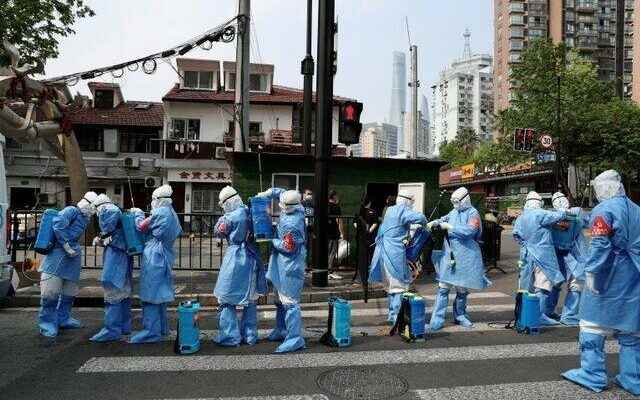In Shanghai, the financial center of China, which has been in quarantine for 3 weeks due to the rapid increase in Covid cases, electronic alarms will now be placed on the doors of Covid patients. In the areas most affected by the wave, houses will be evacuated and disinfected.
Steps will also be taken in Shanghai to quarantine Covid patients faster and increase mass coronavirus testing.
Hundreds of people had to evacuate their homes.
Shanghai has been battling a new wave of Covid for nearly two months.
In the city of 25 million people, which has been under quarantine for 5 weeks, 11 people have died since Thursday.
At the request of Shanghai authorities, hundreds of people were evicted from their homes earlier this week so that the buildings could be disinfected.
On the other hand, it was announced that patients and their contacts who caught Covid would be taken to state-controlled central quarantine hospitals.
While the evacuation procedures are tightened to disinfect the houses in the neighborhoods most affected by the new Covid wave, everyone, including those who test negative, will have to leave their homes.
Authorities had recently requested residents of the Beicai and Pingwang neighborhoods to leave their homes and settle in temporary accommodation centres.
An official in Beicai gave an official notice and asked the residents to evacuate the house after putting all their belongings in suitcases and leaving the doors of their wardrobes open.
The Beicai people, who were asked to leave the entrance doors of their houses open, had to leave their pets behind.
The photos shared on social media of people queuing in front of accommodation centers with suitcases in their hands at midnight showed the scale of the operation.
People find it difficult to access food
These latest measures taken in Shanghai have also shown how far the Chinese government can go to prevent the spread of the Covid pandemic in the financial city.
On the other hand, daily life in the quarantined city is getting harder and harder.

In some neighborhoods, people struggling to access food have to wait for packages of vegetables, meat and eggs distributed by the government.
Supermarket websites, home delivery apps, and even the government’s own delivery services are struggling to keep up with excessive demand.
Although many countries in the world have loosened restrictions, the authorities in China insist on the “Zero Covid” policy, which brings measures to completely eliminate the pandemic.
Concerns are expressed that this policy may not be sustainable in the long run, due to the Omicron variant of the coronavirus, which spreads faster but has milder symptoms.
Since the start of the new Covid wave in March last year, more than 400,000 people have been infected with the virus, and 36 people have died.
According to Chinese officials, the majority of those who lost their lives were the elderly and people with health problems who were not vaccinated.
